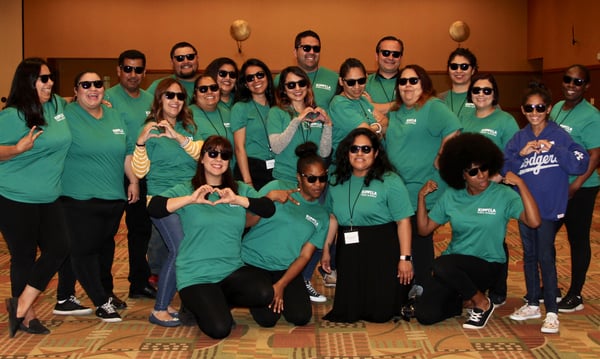Over 200 KIPP LA families recently gathered at Cathedral Plaza in downtown Los Angeles for the 3rd annual KIPP LA Parent Summit hosted by the KIPP LA Family Ambassadors. Families heard from panelists about setting a strong foundation to help achieve a healthy environment and a culture of open communication with children. Read on for top tips from mental health experts, educators, and even a U.S. Olympian!

Let’s Talk: Communicating with Your Child
Christian Hernandez, a KIPP LA Prep eighth-grade science teacher, believes that “student success is created through both hard work and meaningful relationships.” Here are a few of his top tips for families:
- Remember to treat students as people - offer to listen, but also offer space to your child as needed.
- When communicating with children about the concept of “studying,” explain that this differs from homework. Studying is EXTRA practice time for courses of difficulty. Even students in elementary school should begin the habit of studying at least three times/week for 30 minutes.
- As students transition from elementary to middle school, build their independence by gradually making them more and more responsible for school materials, homework, studying etc.
- Once students transition to high school, it is important that they learn to advocate for themselves by communicating their needs to teachers, rather than relying on parents/guardians to do so. They need to not only hold themselves accountable, but also hold their educators accountable.
Guadalupe Cortez is a licensed clinical social worker with the Los Angeles County Department of Mental Health. A few of her suggestions on being an active listener include:
- Often parents want to jump into problem solving, but most of the time children just want to be heard. Help your child share their feelings by leading the conversation with statements that vocalize emotions (e.g., “That sounds like it was a stressful moment” or “What do YOU think you could do to solve this problem?”)
- Model the behavior of vocalizing emotions by sharing your own “highs” and “lows” of the day with your student, and then ask them to share their own.
- Praise is a simple tool that isn’t used enough. While families often praise children for major accomplishments, consider using praise for smaller events, as well.
Joseph Garza is a clinical therapist currently serving as the Staff & Community Engagement Coordinator for Violence Intervention Program. Here are some of his ideas to enhance and increase safety and security within the child-parent relationship:
- Children need to be seen, safe, and loved. Conversations with families make children feel visible, which is powerful because then a child feels love.
- Children are ALWAYS watching, so model the desired behavior you want to see in the home, including positive communication.
- It is helpful for children to have choices and understand the consequences of those choices (e.g., “If you do this, X will happen. If you do this, Y will happen.”)
How to Nurture Your Child’s Purpose
Dr. Portia Jackson Preston is an assistant professor in the Department of Public Health at Cal State Los Angeles and credits her family with nurturing her potential at an early age while also teaching her to embrace balance. Her top tips for families include:
- Sign up children for classes that will give them a taste of what’s possible (e.g., programs on college campuses). You can start small - local, community college courses are a great introduction to higher education. If finances are a concern, speak to the administration and share your circumstances - there is often financial aid available.
- Ask questions of your child’s school and be prepared to advocate for your child, as needed.
- Remind children not to confuse happiness with success. There is so much more to us as human beings than our professional success. Our purpose unfolds and changes over our lifetime.
- Share the story of who you are and why you are the way you are with your child. This will help them understand their options in life, and better understand you as a complete person.
- Validate your child’s experiences, both positive and negative.
- Don’t forget to practice self-care! This does not have to be luxurious or cost large amounts of money, but being refreshed and energized will help you parent your child.
Patricia Cardenas is a 2008 United States olympic silver medalist in water polo. Her passion began in high school, and required the support of her entire community. Here are a few of her recommendations:
- Motivate your child to keep going, even in the face of adversity.
- Do little things so your child feels your support, even if you can’t physically be there every step of the way.
- Surround your child with people who believe in them and will give them the love and support that they both deserve and need to succeed.
%20copy.png?width=572&height=226&name=KIPPSoCal_logo_white.lightblue%20(1)%20copy.png)
